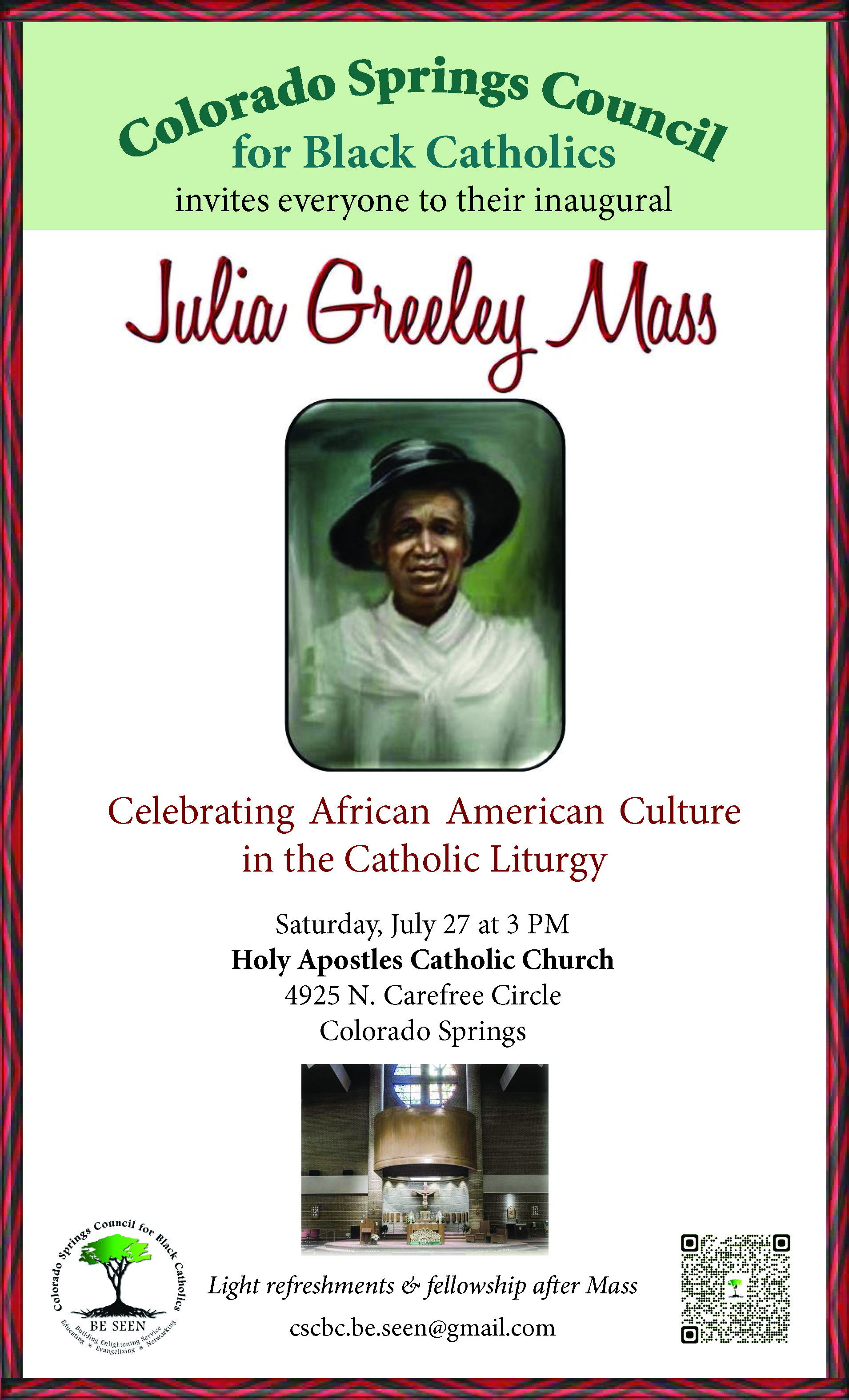Julia Greeley Mass will celebrate African American culture
By Aisha C. Young
COLORADO SPRINGS. The Colorado Springs Council for Black Catholics (CSCBC) will host a bi-monthly Mass at Holy Apostles Church beginning July 28 at 3 p.m. The Julia Greeley Mass for Black parishioners welcomes all who want fellowship with the CSCBC. Anyone interested in participating as a reader, Extraordinary Minister of Holy Communion, musician or usher should send an email to cscbc.be.seen@gmail.com or call 719-822-1261.
 Since its founding in 1990 under the auspices of Bishop Emeritus Richard Hanifen, the CSCBC’s mission has been to “Be Seen.” The Diocese of Colorado Springs is fairly young and has not had the opportunity to grow large enough to support a Black parish. In the Archdiocese of Denver, there are two Black parishes. Since the Diocese of Colorado Springs extends from Parker to Pueblo, it is important that the outreach efforts of CSCBC try to gather parishioners of both African and Caribbean descent, of which there are a significant number.
Since its founding in 1990 under the auspices of Bishop Emeritus Richard Hanifen, the CSCBC’s mission has been to “Be Seen.” The Diocese of Colorado Springs is fairly young and has not had the opportunity to grow large enough to support a Black parish. In the Archdiocese of Denver, there are two Black parishes. Since the Diocese of Colorado Springs extends from Parker to Pueblo, it is important that the outreach efforts of CSCBC try to gather parishioners of both African and Caribbean descent, of which there are a significant number.
The 1984 document titled “What We Have Seen and Heard: A Pastoral Letter on Evangelization from the Black Bishops of the United States,” states that “We are in a position to counter the assumption which many have advanced that to become a Catholic is to abandon one’s racial heritage and one’s people! The Catholic Church is not a ‘white church’ nor a ‘Euro-American church.’ It is essentially universal and hence Catholic. The black presence within the American Catholic Church is a precious witness to the universal character of Catholicism.” This is an opportunity to put into practice the pastoral plan that was established by the National Black Catholic Congress. The Julia Greeley Mass will use hymns from “Lead Me, Guide Me,” the African-American Catholic hymnal, as well as Afrocentric vestments.
Providing a Mass for Black parishioners is a major step for a group that is often unseen. According to the 2022 Pew Research Center report, “Black Catholics in America,” there are approximately three million Black Catholics. This report also shed light on Black Catholics’ desire for racial affirmation in church, teaching of job and life skills, and homilies that address political topics such as immigration and race relations. For many Black Catholics, promoting social justice is essential to being a faithful Christian.
In 1989, Servant of God Sister Thea Bowman delivered what would become a famous speech at the spring meeting of the U.S. bishops’ conference.
“What does it mean to be black and Catholic?” asked Sister Thea. “It means that I bring myself, my black self. I bring my whole history, my traditions, my experiences, my culture, my African American song and dance and gesture and movement and teaching and preaching and healing and responsibility as gifts to the Church.” The absence of Black parishes is the absence of culturally relevant religious expression.
“You can’t be what you can’t see.” For Black parishioners interested in or seeking vocation, it is crucial to see priests, deacons, and women religious who favor their likeness. This Mass is an opportunity to grow the Catholic Church and vocations in our diocese. In 2020, Wilton Gregory became the first African-American cardinal in the United States. There are six African Americans currently up for sainthood: Venerable Henriette Delille, Venerable Augustus Tolton, Venerable Mother Mary Lange, Servant of God Pierre Toussaint, Servant of God Sister Thea Bowman, and Servant of God Julia Greeley. At this time, there are no African-American canonized saints.
Servant of God Julia Greeley is known for her many charitable works. During her 80 years of life, she begged for the poor and cared for neighborhood children. While middle aged, she converted to Catholicism at Sacred Heart Church in Denver and became a Secular Franciscan.
When she died on June 7, 1918, she had the distinction of being the only Catholic layperson in the history of Denver whose body lay in state in a Catholic church. News reports noted that Denver residents were lined up for hours to pay their respects.
Upon notice of her passing, Jesuit Father Charles McDonnell remarked that she had been a daily Communicant practically since her conversion, charitable to an astonishing degree and had a devotion to the Sacred Heart, the Blessed Virgin and the Blessed Sacrament that was astounding.
“It was not sentimentality, but real piety,” said the priest.
Her cause for canonization was opened in 2016 and on June 7, 2017 — the 99th anniversary of her death — her exhumed remains were transferred to the Cathedral Basilica of the Immaculate Conception in Denver. She is the first person to be buried at the cathedral.
(Aisha C. Young is the President of the Colorado Springs Council for Black Catholics.)
997